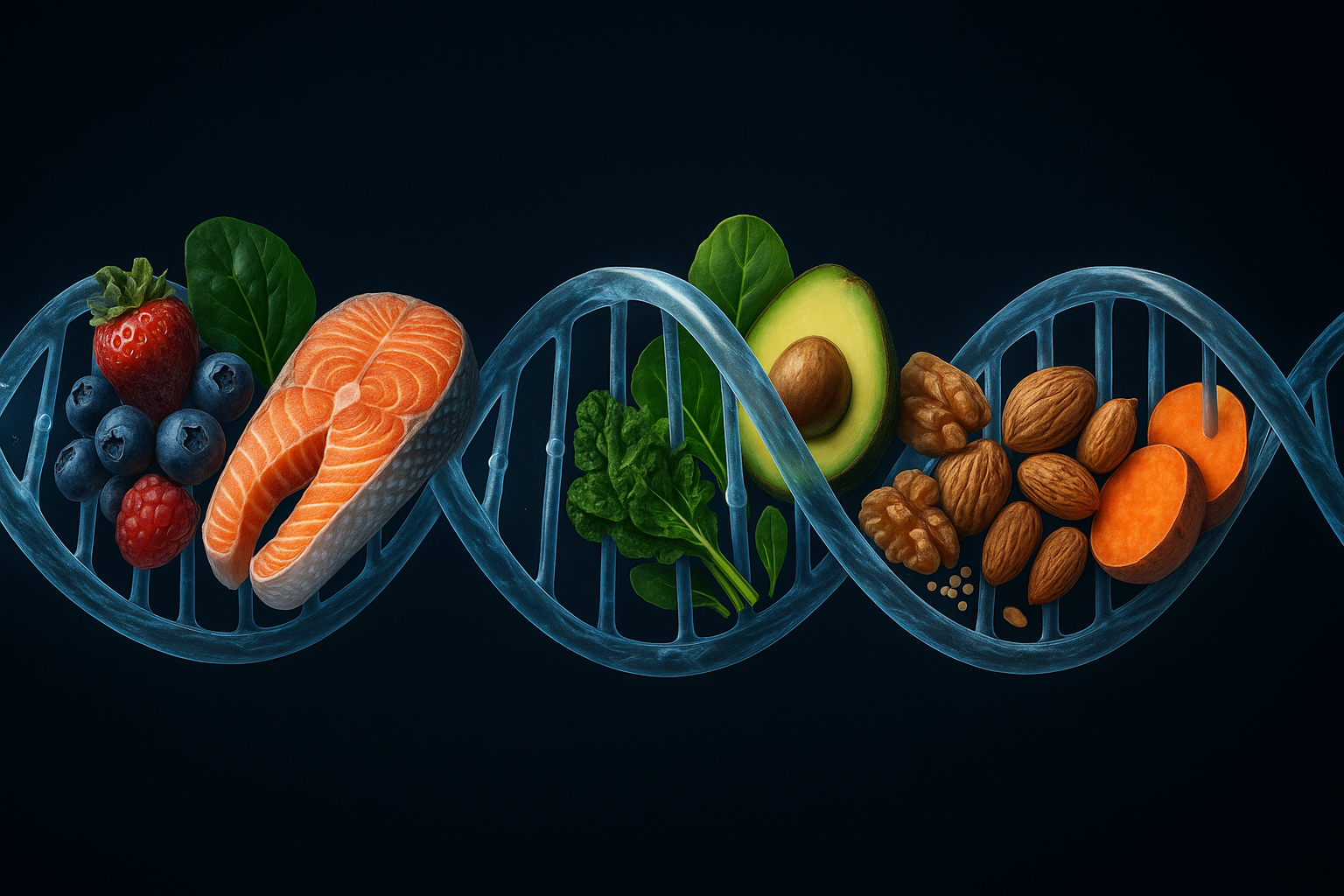
The numbers are staggering: 95% of diets fail, with most people regaining all the weight they lost—plus more—within four to five years[^1]. Despite billions spent annually on nutrition programs, meal plans, and diet books, we’re facing an obesity crisis that continues to worsen. But what if the problem isn’t people’s lack of willpower? What if the fundamental approach to nutrition is flawed?
The truth is uncomfortable for the $61 billion diet industry: one-size-fits-all nutrition plans don’t work because humans don’t have one-size-fits-all metabolisms.
The Illusion of Universal Nutrition
Walk into any bookstore and you’ll find shelves lined with “proven” diet plans. Keto. Mediterranean. Paleo. Plant-based. Each promises to be the answer, backed by compelling testimonials and selective research. Yet UCLA researchers analyzing 31 long-term diet studies found that at least one-third to two-thirds of people regain more weight than they lost, with the true number likely being much higher[^1].
The fundamental flaw lies in the assumption that all human bodies respond identically to the same foods. Traditional nutrition plans are built around population averages—treating your unique metabolism as if it’s exactly the same as everyone else’s.
The Science of Metabolic Individuality
Recent breakthrough research has shattered the myth of uniform food responses. A comprehensive Stanford study using continuous glucose monitoring found that individuals showed “considerable interindividual variability” in their glycemic responses to the same carbohydrate meals[^2]. Even more striking: people who spiked highest to potatoes were more insulin resistant, while those who spiked to grapes were more insulin sensitive—revealing distinct metabolic phenotypes[^2].
This isn’t just about blood sugar. Research published in Nature Medicine demonstrated that large variability exists in people’s responses to foods, with individual postprandial glucose and triglyceride responses varying dramatically even when consuming identical meals[^3].
The key insight: Your neighbor might thrive on the exact diet that makes you gain weight, feel sluggish, and constantly hungry.
Why Generic Plans Fail You
1. Metabolic Adaptation Mismatch When you follow a generic calorie-restricted diet, your body interprets this as starvation and automatically slows your metabolism to maintain life. This metabolic slowdown persists even after stopping the diet, making weight regain almost inevitable. Generic plans can’t account for your individual metabolic response patterns.
2. Genetic Variations Research in nutrigenomics has uncovered specific genetic variants that affect nutrient intake and metabolism, with individual responses to dietary interventions varying significantly based on genetic variability[^4]. For example, variants in the MTHFR gene affect folate metabolism and are linked to cardiovascular disease and diabetes, with certain individuals requiring tailored folate intake[^4].
3. Microbiome Differences Your gut microbiota—considered your “second genome”—varies dramatically between individuals and significantly influences how you process different foods[^5]. A high-fiber diet that promotes weight loss in one person might cause digestive distress in another due to microbiome differences.
4. Psychological Sustainability Research published in Appetite found that psychologically banning foods leads to overconsumption, with dieters who were told to abstain from favorite snacks for 24 hours consuming 133% more compared to those given no restrictions[^6]. Generic diets often eliminate entire food groups, creating an unsustainable psychological burden.
The Individual Response Revolution
Groundbreaking studies are revealing just how unique your food responses really are:
- Researchers using continuous glucose monitoring found that postprandial glycemic responses to identical meals are “reproducible within the same person, but show high variability between different people”[^7]
- Studies examining metabolic responses to high and low glycemic meals identified distinct response groups, with some individuals showing completely different metabolite patterns despite eating the same foods[^8]
- Stanford researchers discovered that blood sugar response patterns are associated with specific metabolic conditions, with “potato-spikers” showing different insulin sensitivity than “grape-spikers”[^2]
The implications are revolutionary: Two people can eat identical meals and have completely different metabolic responses, hunger patterns, and weight outcomes.
What Actually Works: Personalized Nutrition
The solution isn’t another generic diet—it’s understanding your unique metabolic blueprint. A randomized clinical trial published in Nature Medicine found that personalized dietary programs addressing metabolic heterogeneity were significantly more effective at improving cardiometabolic health than standard dietary advice[^3].
The Machine Learning Advantage
While traditional approaches rely on population averages, machine learning can identify patterns in your individual responses that would be impossible to detect manually. Research shows that machine learning algorithms incorporating dietary habits, physical activity, and gut microbiota data can successfully resolve elevated postprandial glucose responses through personalized diet creation[^9].
How Machine Learning Transforms Nutrition:
- Pattern Recognition: Algorithms can identify subtle correlations between foods, timing, stress levels, sleep, and your metabolic responses
- Continuous Learning: Your nutrition plan evolves as the system learns more about your unique patterns
- Multi-Variable Integration: Unlike humans, ML can simultaneously consider hundreds of variables affecting your metabolism
- Predictive Insights: Advanced algorithms can predict how you’ll respond to foods before you eat them
The Glialis Approach
Rather than forcing you into a predetermined mold, Glialis uses machine learning trained on thousands of real users to:
- Identify your metabolic phenotype based on your individual food responses
- Predict optimal meal timing and composition for your unique physiology
- Adapt recommendations continuously as your body and lifestyle change
- Account for your complete profile—genetics, activity, stress, sleep, and preferences
This isn’t about eliminating entire food groups or following rigid rules. It’s about understanding which foods work best for YOUR body, when to eat them, and how to combine them for optimal results.
The End of the Diet Cycle
Research consistently shows that 95% of diets fail because they require permanent lifestyle changes while providing only temporary, unsustainable approaches[^1]. The solution isn’t trying harder with the same broken system—it’s using a fundamentally different approach.
The future of nutrition is personal. As researchers note, “it is increasingly evident that one size does not fit all,” and personalized dietary intervention strategies provide the opportunity to increase the effectiveness of dietary prevention and treatment[^10].
Instead of fighting your biology with generic restrictions, imagine working WITH your unique metabolism. Instead of temporary compliance followed by inevitable regain, picture sustainable habits that feel natural because they’re designed specifically for you.
Your Metabolic Fingerprint
Your metabolism is as unique as your fingerprint. Advanced personalized nutrition approaches now integrate biomedical data, behavioral signatures, and food environment data to create “Adaptive Personalized Nutrition Advice Systems” that respond dynamically to individual-specific information.
This represents a fundamental shift from asking “What diet should I follow?” to “What does MY body need?”
The one-size-fits-all era is ending. The data is clear, the technology exists, and the results speak for themselves. The question isn’t whether personalized nutrition works—it’s whether you’re ready to stop forcing your unique biology into generic molds and start honoring your metabolic individuality.
Your body has been trying to tell you what works. It’s time to listen.
References
[^1]: Mann T, Tomiyama AJ, Westling E, et al. Medicare’s search for effective obesity treatments: diets are not the answer. Am Psychol. 2007;62(3):220-33.
[^2]: Zeevi D, Korem T, Zmora N, et al. Personalized nutrition by prediction of glycemic responses. Cell. 2015;163(5):1079-94.
[^3]: Wu Y, et al. Individual variations in glycemic responses to carbohydrates and underlying metabolic physiology. Nat Med. 2025 Jun 4. doi: 10.1038/s41591-025-03719-2.
[^4]: Berry SE, Valdes AM, Drew DA, et al. Human postprandial responses to food and potential for precision nutrition. Nat Med. 2020;26(6):964-73.
[^5]: Garcia-Perez I, et al. Objective assessment of dietary patterns by use of metabolic phenotyping: a randomised, controlled, crossover trial. Lancet Diabetes Endocrinol. 2017;5(3):184-95.
[^6]: Cirulli ET, Guo L, Leon Swisher C, et al. Profound perturbation of the metabolome in obesity is associated with health risk. Cell Metab. 2019;29(2):488-500.
[^7]: Goni L, Cuervo M, Milagro FI, Martínez JA. Gene-diet interactions in the development of Type 2 diabetes. Nutrients. 2017;9(7):710.
[^8]: Roman S, Campos-Medina L, Leal-Mercado L. Personalized nutrition: the end of the one-diet-fits-all era. Front Nutr. 2024;11:1370595.
[^9]: Koliada A, Syzenko G, Moseiko V, et al. Association between body mass index and Firmicutes/Bacteroidetes ratio in an adult Ukrainian population. BMC Microbiol. 2017;17(1):120.
[^10]: Stunkard AJ, McLaren-Hume M. The results of treatment for obesity: a review of the literature and report of a series. AMA Arch Intern Med. 1959;103(1):79-85.
